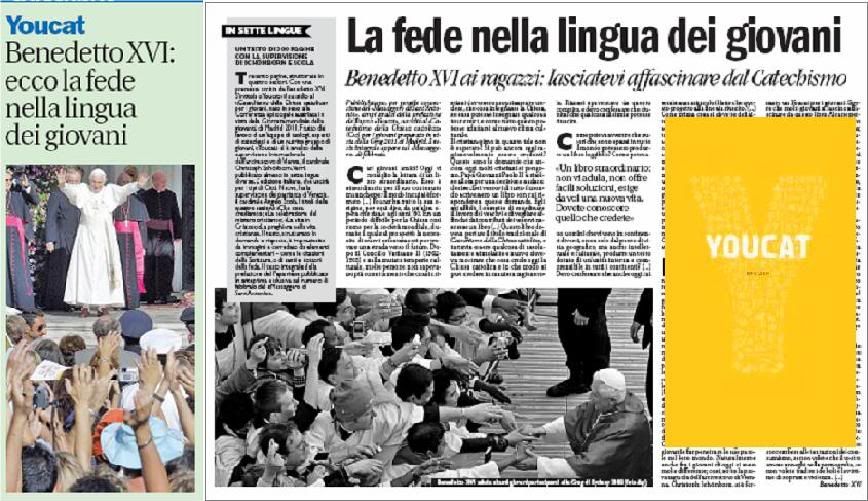| | | OFFLINE | | Post: 22.064
Post: 4.692 | Registrato il: 28/08/2005
Registrato il: 20/01/2009 | Administratore | Utente Master | |
|


 See preceding page for earlier entries today, 2/3/11.
See preceding page for earlier entries today, 2/3/11.


 YOUCAT for WYD Madrid:
YOUCAT for WYD Madrid:
The Pope puts his faith
in the youth of today

02 FEB 2011 (RV) - “Some people tell me that the youth of today are not interested in the catechism, but I do not believe this statement and I am certain that I am right. They are not as superficial as they are accused of being; young people want to know what life really is about. A crime novel is compelling because it involves the fate of other people, but it could be our own, this book is compelling because it speaks to us of our own destiny and therefore is closely related to each of us”.
These the words of Pope Benedict XVI in the forward to a book, soon to be published in 7 languages, entitled “YouCat”, short for Youth Catechism of the Catholic Church, which is the official catechism for World Youth Day.
Written for high-school age people and young adults, YOUCAT is an accessible, contemporary expression of the Catholic Faith based on the Compendium of the Catechism of the Catholic Church, published in 2006 as a more accessible form of the 1992 Catechism of the Catholic Church..
The popular format includes Questions-and-Answers, highly-readable commentary, margin pictures and illustrations, summary definitions of key terms, Bible citations, and quotes from the Saints and other great teachers.
The project for the Catechism of the Catholic Church, in the Pope’s own words, was first entrusted to the Congregation for Bishops, by his predecessor John Paul II. It took its origin from another work dating back to the 1980s, a period Pope Benedict XVI describes in his forward as “difficult ...for the Church as well as for global society, during which the need emerged for new approaches to find a way forward towards the future”.
After Vatican II (1962-1965) and in the changed cultural climate, he notes, “many people did not know what Christians should really believe, what the Church teaches, if it can teach something outright, and how this might fit into the new cultural climate”.
Thus, John Paul II entrusted the man who would be his successor with the task of coordinating the work of bishops, theologians and young people into a book, edited by the Archbishop of Vienna, Cardinal Christoph Schoenborn.
[Cardinal Schoenborn also supervised the preparation of the YOUCAT in German, to be translated into the other official languages of the Vatican. The English YOUCAT is published by Iagnatius Press and will come out in March.]
Pope Benedict writes that he “was afraid of this task”, and confesses his doubts that "it would succeed”, describing its existence as something of a “miracle”, the labour of many meetings and “passionate discussions over individual texts”.
He then goes on to express the hope that young people will allow themselves to be “captivated” by the catechism, and his certainty that they are far more interested in it than most believe.
In fact he writes; “this aide to the catechism does not offer you any empty praise, it does not offer easy solutions, it requires a new life on your part”. He asks young people to “study the catechism with passion and perseverance! Sacrifice your time for it!”...
Here is a translation of the entire Foreword:
FOREWORD to YOUCAT
by Benedict XVI
Translated from the 2/3/11 issue of

Dear young friends:
Today I advise you to read an extraordinary book.
It is extraordinary for its content but also for the way in which it is presented, that I wish to explain to you briefly so that it may be understood well.
Youcat takes its origin, so to speak, from another work which dates to the 1980s. It was a difficult period for the Church as well as for world society, during which there was a need for new orientations in order to find a road to the future.
After the Second Vatican Council (1962-1965), and in a changed cultural climate, many persons no longer knew correctly what Christians should believe in, what the Church really taught, and if it could still teach anything, for that matter, and how all of these necessities could be adapted to the new cultural climate.
Had Christianity as such been transcended? Could one still be reasonably a believer? These are questions that many Christians today continue to face.
Thus Pope John Paul II made a daring decision: He decided that all the bishops of the world should write a book to answer these questions.
He entrusted to me the task of coordinating the work of the bishops and to assemble a book from their work - a true book, and not just a presentation of multiple texts.
The book was to have the traditional title of Catechism of the Catholic Church(CCC), but it had to be absolutely new and stimulating. It was to show what the Catholic Church believes, and how one can believe in this teaching reasonably.
I was awed by the assignment, and I must confess that I doubted if it would succeed. How could authors spread around the world produce a readable book? How could men who lived in different continents - not only geographically, but also intellectually and culturally - produce a text that would have an internal unity and be understood in all the continents?
One also had to consider that the bishops would have to write their contributions not simply as individuals but in representation of their fellow priests and their local churches.
I must confess that even today, I find it a miracle that the project did succeed. We [the editorial committee in the Vatican] would meet for a week three or four times a year to discuss each single text that was submitted and as it was developed.
First of all, the structure of the book had to be defined. It must be simple, so that the groups of authors could each get a clear assignment, and they could frame their statements in an uncomplicated way.
This is the same structure followed in this book which reflects the catechetical experience through the centuries: what do we believe, how do we celebrate the Christian mysteries, how do we live in Christ, how should we pray.
I will not explain here how we dealt with the numerous questions that had to be answered systematically until we had a real book. In a work of this kind, there are many arguable points: everything men can do is always insufficient and can always be done better, but despite all that, this is a great book, a sign of unity in diversity. From many voices, a choir, coming from a faith that is shared, which the Church has handed down to us from the Apostles through the centuries to our day. [The CCC was published in 1992.]
Why all this effort?
At the time we were drafting the CCC, we had to consider not only that the continents and the culture of their peoples were different, but that even within each single society there are different 'continents': the urban worker has a different mentality from the peasant, a physicist different from a philologist, an entrepreneur different from a journalist, a young person different from older people.
For this reason, in the language of the book as well as in its thought, we had to be above these differences, and seek a space common to all the different mental universes. Thus, we became even more aware that the text would then have to undergo translations for these different worlds in order to be able to reach all people with different mentalities and different problems.
On many World Youth Days (Rome, Toronto, Cologne, Sydney, etc), young people from around the world have come together - young people who want to believe, who are in search of God, who love Christ, and who want to follow a common path.
In this context, we asked ourselves whether we shouldn't translate the Catechism of the Catholic Church into the language of young people and let its words penetrate their world.
Of course, even among young people today, there are many differences. Therefore, under the experienced guidance of the Archbishop of Vienna, Christoph Schönborn, the Youcat for young people was born.
I hope that many young people will let themselves be fascinated by this book.
Some people tell me that catechesis does not interest young people today, but I do not believe this, and I am sure I am right. Young people are not as superficial as they are often accused of being.
Young people want to know what life really is. A crime novel appeals to us because it involves us in the fate of other people that could very well be ours too. This book is appealing because it speaks to us of our destiny and therefore concerns each of us closely.
That is why I invite you to study the catechism. This is my heart's desire.
This aide to catechism does not praise you. It does not offer easy solutions. It demands a new life from you. It presents the message of the Gospel like the 'precious pearl' (Mt 13,34) for which one must give everything.
That is why I ask you: Study the catechism with passion and perseverance. Sacrifice some of your time for it. Study it in the silence of your room. Read it with others. Among friends, form study groups and networks. Exchange ideas on the Internet.
In any case, remain in dialog with your faith.
You must know what you believe in. You must know your own faith with the same precision that an information technologist knows everything about a computer's operation. You must know it as a musician knows his music.
And yes, you must be more profoundly rooted in the faith than the generation of your parents in order to resist forcefully and decisively the challenges and temptations of our time.
You need God's help if your faith is not to dry up like a dewdrop under the sun; if you are not to succumb to the temptations of consumerism; if you do not wish your love to drown in pornography; if you are not to betray the weak and the victims of rape and violence.
If you dedicate passion to the study of the Catechism, then I have one more advice: You all know how the community of believers has been in recent years wounded by the assault of evil, by the penetration of sin within the Church itself, indeed, into its very heart.
Do not use this as a pretext to flee the presence of God. You yourself are the Body of Christ, the Church. Carry the flame of love intact for this Church every time that others obscure her face. "Do not grow slack in zeal, be fervent in spirit, serve the Lord" (Rm 12,11).
When Israel was in the darkest hour of her history, God called to their aid not great men and esteemed persons, but a young man named Jeremiah, who felt himself invested with a mission that was too great: "'Ah, Lord GOD!'," I said, 'I know not how to speak; I am too young'." (Ger 1,6). But God would not let him take the way out: "Say not, 'I am too young'. To whomever I send you, you shall go; whatever I command you, you shall speak" (Jer 1,7).
I bless you and pray every day for all of you.

I love the pitch-perfect tone of this Foreword - you can hear him speaking directly to you, one on one!
 BENEDICT XVI TO THE YOUNG: 'Let yourself be fascinated by the Catechism!
BENEDICT XVI TO THE YOUNG: 'Let yourself be fascinated by the Catechism!
[Modificato da TERESA BENEDETTA 06/02/2011 10:59] |